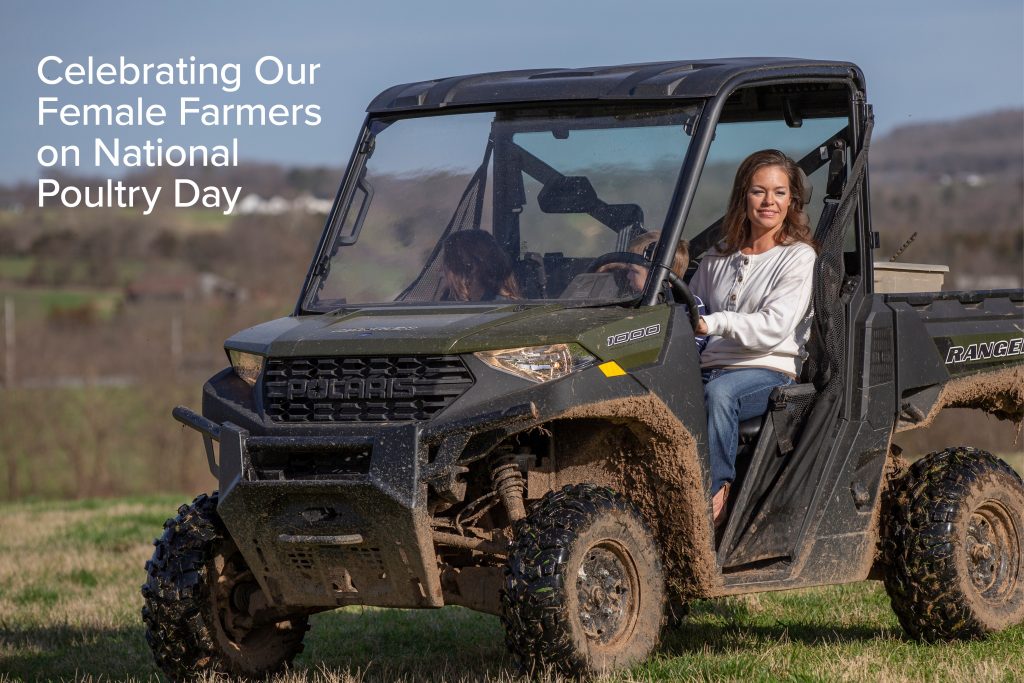All this month, we’ve been sharing and highlighting the voices and accomplishments of women to honor Women’s History Month. Today is also National Poultry Day, an opportunity to celebrate the farmers that work daily to provide chicken, turkey and eggs for family tables across the globe. In recognition of these two observances, we want to spotlight female poultry farmers and their essential place in the industry.
By and large, women have been left out of the conversation when it comes to farming. I didn’t know about Harriet Williams Russell Strong, a pioneer in irrigation and water conservation who invented new methods of conserving flood waters to supply her California ranch. She single-handedly saved her family farm after being widowed and became the Walnut Queen – the leading commercial grower of walnuts in the country. I’d also never heard of Dr. Mary Engle Pennington, the U.S. Food and Drug Administration’s (FDA) first female lab chief. She developed the standards for safely processing chicken and researched and devised spoilage-free methods of storing and shipping poultry.
According to the United States Department of Agriculture (USDA) 2017 census, 40% of poultry and egg producers were women. Poultry and egg producers also tended to be younger, with 81% under the age of 64 compared to 66% of producers across all farming categories. Beginning farmers (those farming for less than 10 years) like Dara Martin of Martin Farms accounted for 37%. She’s been farming with Tyson Foods since 2019.
“I think there’s a misunderstanding that women either don’t farm, or that they aren’t as involved or educated in the process of farming,” Martin said. “There are some absolutely amazing women in farming, some of the smartest and strongest women I know.”
This misunderstanding has been felt by many. Tyson Foods’ Kim Tarlton of Tarlton Farms in North Carolina grew up poultry farming, and she and her husband have been running their farm since 2010. In addition to the day-to-day work, Tarlton handles the finances, does their taxes, gets parts for machinery when needed, and helps maintain farm operations. It’s a business, Tarlton said, so you have to be business minded. But even with her wide scope of experience, Tarlton felt like it took years to build respect with other industry members in the community, except with Tyson.
“Tyson Foods has been amazing for me because I never had to build respect with them,” Tarlton said. “Even at the time when the industry was mostly men, respect was automatically given.” Tarlton’s farm was named a Producer of the Year in 2019.
Stoni Jo Gates, another Tyson Foods contract farmer and 20-year veteran of the industry, also talked about the importance of strong business relationships and industry and community support to the success of female farmers.
“Tyson has an unlimited amount of knowledge and support for me so I’m confident I can be a good poultry farmer,” Gates said. “I’m never alone.”
Support, encouragement, and education are essential to success in any industry but especially necessary for women in farming where the number of female producers grew by 27% from 2012 to 2017. It’s also important, all three women said, because it’s a profession that feels undervalued by the public.
“I wish everyone had the opportunity to see how much farmers actually care about their animals,” Martin said, “and how hard they work to take care of what’s been entrusted to them.”
“People look down on it,” Tarlton said. “They think it’s a lesser job.”
Gates said she is proud to provide for her community, even if that contribution is overlooked. It’s a legacy she, Tarlton, and Martin hope to instill in the next generation.
“Maybe my girls will help increase those numbers of female farm owners and operators,” Martin said. “Maybe the key is having strong examples of female farmers who are passionate about opportunity and industry.”
The next generation of poultry farmers will continue to innovate, find new ways to streamline processes, integrate new technology, and, foremost, continue to provide the best environment for animals in their care.
“It’s amazing how much poultry farming has changed since my parents started,” Tarlton said. “But we work and continue to improve because care for the birds is the future.”
Tyson Foods has been working with independent poultry farmers since the 1940s and currently works with more than 4,000 independent poultry farmers. We supply the birds, feed and technical advice, while the farmers care for the chickens by providing the farm, housing and labor.
Learn more about our relationship with independent poultry farmers here.





